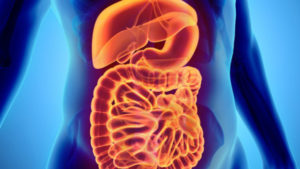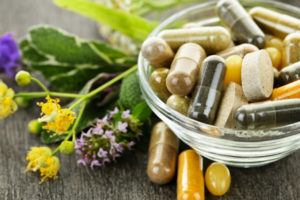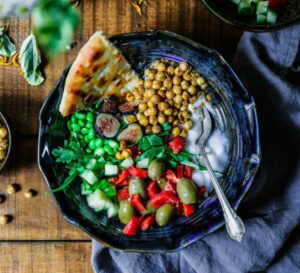Having a healthy gut is one of the key factors in how we think and feel on a day-to-day basis. Our mood, our energy level and our recovery after a workout all depend on how healthy our digestive system functions.
 The inability to break-down and digest foods, to then be absorbed into our body can limit our recovery time. It’s simple nutrition practices such as eating high amounts of pro and prebiotic foods which can make the biggest difference in our performance.
The inability to break-down and digest foods, to then be absorbed into our body can limit our recovery time. It’s simple nutrition practices such as eating high amounts of pro and prebiotic foods which can make the biggest difference in our performance.
To give you an understanding of the importance of gut health and performance; Probiotics and prebiotics help to restore the natural ‘healthy’ bacteria in your gut which there are thousands to more than 3 million genes. When you exercise, you put additional strain on your digestive system, making it weaker the more you exercise – damaging the delicate ecosystem in your gut.
Inside this article, I’ll explain the importance of gut health on physical/mental performance and how it can prevent illnesses. I’ll also explain the difference between probiotics and prebiotics, and how they can positively affect our sports performance and recovery.
Table of Contents
The Importance of Gut Health
Inside the human body, you’ll find a complex nature of microbiota, also known as gut flora. This complex ecosystem plays a huge role in homeostasis and immunostains. These elements are not only important for our overall health and well-being but also our sports performance and recovery.
 Hippocrates said, “all disease begins in the gut” and “let food be thy medicine”.
Hippocrates said, “all disease begins in the gut” and “let food be thy medicine”.
What you eat, the air you breathe, and the stressors you experience put your GIT under pressure. The tens of trillions of microorganisms, which consist of 1000 different species, and originate from over 3 million genes are destroyed and weakened anytime oxidative stress builds up, or when foreign bodies enter your digestive tract.
For example, homeostasis is classified as the balance of health within your body. When undergoing stress (physical or mental) your body will aim to reach a balance – homeostasis. Supplements such as inulin and ashwagandha have been shown to improve levels of homeostasis.
To highlight this point further; our gastronomical tract (GIT) contains an epithelial barrier. This epithelial barrier covers an area of 400 m2. And it’s this area inside of your body that’s open to the outside world and its pollutants. Plain and simple, your digestive tract is the place with the “highest exposure to the external environment”. (I)
The Difference Between Prebiotics and Probiotics
 Probiotics add to the existing bacteria in your gut, while prebiotics act as ‘food’ for the same existing bacteria. This allows them to grow and multiply – creating a stronger immune system.
Probiotics add to the existing bacteria in your gut, while prebiotics act as ‘food’ for the same existing bacteria. This allows them to grow and multiply – creating a stronger immune system.Prebiotics can be found in many fibre-rich foods, such as vegetables, fruits and grains. Probiotics, on the other hand, are found in fermented foods. These include yoghurt, cabbage and soft cheese.
 The problem with probiotics is that many of the ‘healthy’ bacteria which are sent into your gut are destroyed through digestive enzymes. Prebiotics work in the opposite way. When you ingest prebiotics, they pass through your digestive tract, reaching your already existing gut bacteria.
The problem with probiotics is that many of the ‘healthy’ bacteria which are sent into your gut are destroyed through digestive enzymes. Prebiotics work in the opposite way. When you ingest prebiotics, they pass through your digestive tract, reaching your already existing gut bacteria.
It’s the role of prebiotics to feed your already existing gut bacteria, making your immune system stronger, allowing for improved recovery, greater time to exhaustion along with an improved mood.
Therefore, if you’re looking to enhance the ‘good bacteria’ environment of your intestines, then I’d suggest looking into using some form of prebiotic a.k.a. inulin. Whether that’s direct from the plant, or in supplement form.
READ: How Inulin Improves Health and Performance
Prebiotics and Probiotics on Performance
Studies show that consuming probiotics surrounding intense workouts limits damage to the gut – allowing for greater nutrient absorption. Furthermore, consuming probiotics can also increase time to exhaustion when exercising.
 In one study which tested ten trained endurance runners in extreme heat, where they ran to exhaustion at 80% of their VO2 Max, found their time to exhaustion and immune health increased compared to the placebo group.
In one study which tested ten trained endurance runners in extreme heat, where they ran to exhaustion at 80% of their VO2 Max, found their time to exhaustion and immune health increased compared to the placebo group.This was thanks to the way probiotics reduced stress on their gut, more specifically – intestinal permeability and the absorption of toxins. Therefore, the study concluded that probiotics did reduce stress on the intestines that would otherwise be caused by exercise.
However, and what’s more interesting, is that their time to exhaustion increased in the probiotic group. On average, a 16% increase in their run time to exhaustion was noted compared to the placebo group.
As for how much and what the tested group used: The runners supplemented with 45 billion bacteria per day for four weeks. This consisted of lactobacillus, bifidobacterium and streptococcus strains. (II)
Other Health Benefits of Prebiotics and Probiotics
As our health begins in the gut, it then makes sense that what we eat can also affect other parts of our body. How well we digest food is one thing, and how well we can fight off illnesses is another.
And it’s now even emerging that our gut plays an important role in how we feel – affecting chemicals in our brain such as the production of serotonin – the feel-good brain chemical (see how serotonin is made using L-Tryptophan).

Improved Digestion
Studies have shown that calcium absorption along with improved bone mineralization increased when taking the prebiotic inulin. (III) Calcium is not only important for bone strength, but it also improves muscle contractions during exercise.
Furthermore, conditions such as chronic constipation, chronic disease and irritable bowel syndrome have also improved once additional probiotics are introduced into the diet – allowing for more nutrients to be absorbed. (IV)
Lowered Risk of Diseases
When our blood triglycerides and HDL cholesterol are high, it could lead to a number of health issues. Such as heart attacks and stroke to name a few. But when researchers gave prebiotics to a group of women with these signs, it did, in fact, decrease their harmful cholesterol numbers significantly within the 8-week study. (V)
Apart from the obvious benefits of increasing gut health, this was also in part thanks to the added fibre from the prebiotics used. It’s the fibre inside many prebiotics that helps to break down fat while easing digestion.
A Stronger Immune System
 Our immune system can be attacked from all angles. From high levels of exercise to the air pollution on your daily commute and even your home or working environment can have an impact on your health – not to mention the foods you eat which contain pesticides and heavy metals.
Our immune system can be attacked from all angles. From high levels of exercise to the air pollution on your daily commute and even your home or working environment can have an impact on your health – not to mention the foods you eat which contain pesticides and heavy metals.
And as we’ve already discussed, your gastronomical tract (GIT) is heavily exposed to the external world. Therefore, the more exposed you are to ‘toxic’ environments, the more likely you are to encounter infections and illnesses.
It’s been shown that people with a GIT which contains a well-balanced ecosystem of gut flora has a lower percentage of catching a common cold. (VI) Furthermore, having adequate levels of healthy gut bacteria also helps to reduce inflammation and oxidative stress, which are brought on by exercise – causing fatigue and delayed recovery.
Better Mental Health
When you consume food sources that contain l-tryptophan they are then get converted into serotonin – the brain chemical that makes you feel happy and relaxed.
However, what if your body doesn’t efficiently absorb the amino acid l-tryptophan from the foods you eat or supplements you use? To put it in simple terms, the food you’re eating would have little effect other than adding calories into your body.
Furthermore, B vitamins convert foods into energy, more specifically – energy for the mind. Therefore, when you have an imbalance of gut flora and you eat a meal containing B vitamins and amino acids such as l-tryptophan, you may not be receiving the full benefits – hence the reason you might feel agitated, low in positivity, or highly stressed.
Prebiotics and Probiotics Foods
 Supplements are a good option to increase the number of probiotic and prebiotic bacteria in your gut. You’ll find probiotic yoghurts, to fermented cereals, and beverages which promote gut health.
Supplements are a good option to increase the number of probiotic and prebiotic bacteria in your gut. You’ll find probiotic yoghurts, to fermented cereals, and beverages which promote gut health.
Not to mention the relatively new prebiotic supplements which feed your existing gut bacteria – creating a robust ecosystem.
However, when you’re looking to increase the number of foods in your diet that have a similar effect, there is a handful of ‘gut healthy’ foods which have been studied to promote improved health, from all angles.
Eating more of these foods (listed below) surrounding your training will lower inflammation and improve health. Furthermore, they will also shorten your recovery times and extend your performance whilst fighting off infections.
Probiotics
- Yoghurt – made from milk high in bifidobacteria, which helps to prevent infections. (VI)
- Kefir – a fermented probiotic milk product which improves bone health by increasing calcium absorption. (VII)
- Sauerkraut – shredded cabbage fermented in lactic acid bacteria which is high in B-vitamins. (VIII)
- Tempeh – made from soybeans high in B 12 which is important for energy metabolism. (IX)
- Kimchi – a fermented cabbage which contains lactic acid bacteria that’s important for digestion, also known as Lactobacillus kimchii. (X)
Prebiotics
- Chicory Root – contains high amounts of inulin, which is an important fibre and food source for probiotic bacteria in your gut. (XI)
- Dandelion Greens – just like with chicory root, these greens hold large amounts of inulin which promotes improved digestion and food absorption. (XII)
- Artichoke – contains 2grams of fibre per 100 grams. And 76% of that fibre is made up of inulin. (XIII) What’s more interesting is that artichokes’ contain certain bacteria that prevent metabolic disorders. (XIV, XV) (XVI)
- Garlic – garlic’s fibre contains two beneficial prebiotics. The first being inulin (11%) and fructooligosaccharides (FOS) (6%) – which relieves constipation. Furthermore, garlic also promotes the growth of Bifidobacteria – which prevents infections from occurring. (XVII)
- Asparagus – holds many benefits from anti-cancer properties to high amounts of probiotic benefits via its inulin content. Every 100 grams holds roughly 2-3 grams of inulin. (XVIII)
Sport Nutrition Expert Recommendation?
 For a way to increase your immune system, your cognition, your sports recovery and performance – starting at the gut is the future!
For a way to increase your immune system, your cognition, your sports recovery and performance – starting at the gut is the future!
Both prebiotics and probiotics work to enhance your already existing gut bacteria. However, bear in mind that probiotics may not work to their full effect. This is because they can be damaged by the acids in your stomach.
This is where you’ll want to choose prebiotics. Prebiotics directly feed your already existing gut bacteria, enhancing not only your performance but also your overall health and well-being.
And as we’ve already discussed, new research is still emerging on the close relationship between the foods you eat and your mood and vitality. Therefore, eating the right foods at the right times is becoming more important for those of you who are looking to gain a competitive edge on your recovery.
I hope this article has shed some light into how certain pro and prebiotic foods can increase your performance, recovery and overall health and well-being. For more information on prebiotics, you can read my article on inulin, a powerful gut health ingredient.
Resources:
(I) Neish, Andrew S. “Microbes in Gastrointestinal Health and Disease.” Gastroenterology, U.S. National Library of Medicine, Jan. 2009. (source)
(II) Shing, Cecilia M, et al. “Effects of Probiotics Supplementation on Gastrointestinal Permeability, Inflammation and Exercise Performance in the Heat.” European Journal of Applied Physiology, U.S. National Library of Medicine, Jan. 2014. (source)
(III) Griffin, I J, et al. “Non-Digestible Oligosaccharides and Calcium Absorption in Girls with Adequate Calcium Intakes.” The British Journal of Nutrition, U.S. National Library of Medicine, May 2002. (source)
(IV) Harvard Health Publishing. “Health Benefits of Taking Probiotics.” Harvard Health. (source)
(V) Dehghan, Parvin, et al. “Effects of High-Performance Inulin Supplementation on Glycemic Status and Lipid Profile in Women with Type 2 Diabetes: a Randomized, Placebo-Controlled Clinical Trial.” Health Promotion Perspectives, Tabriz University of Medical Sciences, 30 June 2013. (source)
(VI) Harvard Health Publishing. “Can Gut Bacteria Improve Your Health?” Harvard Health. (source)
(VII) P.H.P.Prasanna et al. “Bifidobacteria in milk products: An overview of physiological and biochemical properties, exopolysaccharide production, selection criteria of milk products and health benefits”. Food Research International. (source)
(VIII) A. Juszkiewicz, et al. “The Effect of L-Theanine Supplementation on the Immune System of Athletes Exposed to Strenuous Physical Exercise.” Journal of the International Society of Sports Nutrition, BioMed Central, 15 Feb. 2019. (source)
(IX) Kubala, Jillian. “9 Impressive Health Benefits of Cabbage.” Healthline, Healthline Media, 4 Nov. 2017. (source)
(X) Rombouts, F.M. “Recent Developments in Tempe Research.” Wiley Online Library, John Wiley & Sons, Ltd (10.1111), 11 Mar. 2008. (source)
(XI) Yoon, J H, et al. “Lactobacillus Kimchii Sp. Nov., a New Species from Kimchi.” International Journal of Systematic and Evolutionary Microbiology, U.S. National Library of Medicine, Sept. 2000. (source)
(XII) Kleessen, Brigitta, et al. “Jerusalem Artichoke and Chicory Inulin in Bakery Products Affect Faecal Microbiota of Healthy Volunteers.” The British Journal of Nutrition, U.S. National Library of Medicine, Sept. 2007. (source)
(XIII) “Dandelion Greens, Raw Nutrition Facts & Calories.” Nutrition Data Know What You Eat. (source)
(XIV) “Jerusalem-Artichokes, Raw Nutrition Facts & Calories.” Nutrition Data Know What You Eat. (source)
(XV, XVI) Samal, Lipismita, et al. “Prebiotic Potential of Jerusalem Artichoke (Helianthus Tuberosus L.) in Wistar Rats: Effects of Levels of Supplementation on Hindgut Fermentation, Intestinal Morphology, Blood Metabolites and Immune Response.” Journal of the Science of Food and Agriculture, U.S. National Library of Medicine, June 2015. (source)
(XVII) Chang, Wan-Ching, et al. “Beneficial Effects of Soluble Dietary Jerusalem Artichoke (Helianthus Tuberosus) in the Prevention of the Onset of Type 2 Diabetes and Non-Alcoholic Fatty Liver Disease in High-Fructose Diet-Fed Rats.” The British Journal of Nutrition, U.S. National Library of Medicine, 14 Sept. 2014. (source)
(XVIII) Ning Zhang et al. “Study on prebiotic effectiveness of neutral garlic fructan in vitro”Food Science and Human Wellness. (source)
(XIX) Xiang, Jianfeng, et al. “Anticancer Effects of Deproteinized Asparagus Polysaccharide on Hepatocellular Carcinoma in Vitro and in Vivo.” Tumour Biology: the Journal of the International Society for Oncodevelopmental Biology and Medicine, U.S. National Library of Medicine, Apr. 2014. (source)

Leave a Reply